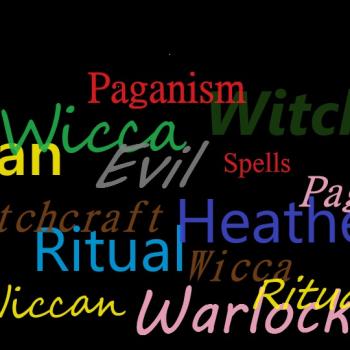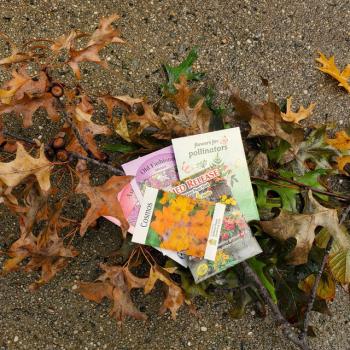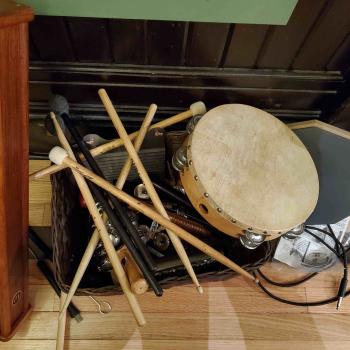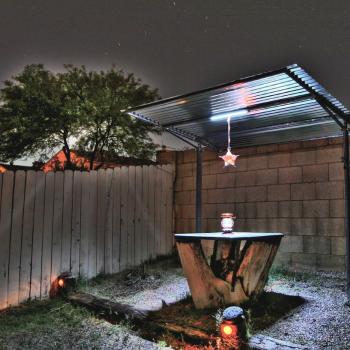Pagans are often quite good at connecting with That Which Is Bigger Than Us. Some folks are allergic to God-talk, so this won’t be that, and I hope you’ll read on anyway.
I don’t, myself, much care whether what you experience is “talking to Godness” (whether monotheistic or one of many, whether male or some other gender), or what you experience is “doing a psychological exercise,” or even “having some fun.” What I care about is the results we can bring about, in ourselves and in each other, by enacting well-crafted ritual. Or magic (with or without a terminal ‘-k’). Or worship.
 A lot of UU Sunday mornings follow a fairly traditional Protestant model: we sit in pews all facing front, we listen together as one or two people stand before us and read or preach. From time to time we sing together the words and music written long ahead of time, for a day much like today but, importantly, not special to only today. Some congregations have a moving meditation around Joys and Sorrows or Celebrations and Concerns – maybe people come forward to light a candle, or to place a polished stone in a basin of water. Some Sundays have other elements, but on many Sundays, in many congregations, worship follows this familiar plan.
A lot of UU Sunday mornings follow a fairly traditional Protestant model: we sit in pews all facing front, we listen together as one or two people stand before us and read or preach. From time to time we sing together the words and music written long ahead of time, for a day much like today but, importantly, not special to only today. Some congregations have a moving meditation around Joys and Sorrows or Celebrations and Concerns – maybe people come forward to light a candle, or to place a polished stone in a basin of water. Some Sundays have other elements, but on many Sundays, in many congregations, worship follows this familiar plan.
Often I receive lots of good value from spending an hour or so in Sunday morning worship. And: there are things it doesn’t do.
Pagan rituals are a bit more embodied; some say, a bit more ‘in your face.’ This begins with the arrangement of the space. Whether outdoors or in, much Pagan ritual practice occurs in a circle, where we can see one another. Throughout the ritual, people’s eyes meet, even in the dark.
Often there is the smell of incense, or burning sage. We might call it ‘purification,’ but at the very least it serves to give us one more cue that this time, this place, this gathering is different from ‘ordinary everyday reality.’ Smells are deeply important to our consciousness. A crying baby can be calmed by the smell of a shirt recently worn by a parent, if no parents are present. A whiff of an aroma that was present at some important event can take us right back there, even decades later. And so we use smells in Pagan worship.
In Pagan ritual we honor the Sacred Directions – four (as in the compass points), or six (adding ‘up’ and ‘down’), or seven (including the center, or ‘within’) – and the Elements of Air, Fire, Water, Earth, and Spirit. Often these are invoked quite directly in relation to our bodies: our breath, energy, blood, bone, and consciousness.
And then, in many rituals, in many traditions Pagan and otherwise, there is some central magic, some action intended to produce transformation. Often the ‘action’ will be performed by most or all of those present, either communally or individually, at the same time or one after another. The ‘transformation’ may be a shift in consciousness, emotion, intention, or experience. But it could also be the gift of new information. And because the central magic includes some physical action, whatever changes for each human present tends to change on several levels at once.
The Witch is reading over my shoulder. “You’re being awfully abstract,” she says. “Can’t you be clearer?”
Let’s take up a few examples:
A Ritual Which Alleviated Depression
Some years ago someone I circle with was struggling with a heavy load of childhood baggage. Though adult life had brought success and achievement, this person struggled with shame and self-disgust based on the long-ago past.
In the ritual we crafted, their friends used blades of several kinds to cut away the invisible ties that bound this person to those memories. With a steel sword we cut away the harsh words. With a ceramic knife we cut away the blows of fists and feet. With a dagger made from a whelk shell we cut away the emotional abuse. With a flint-knapped athame we cut away the guilt and shame. With each cut, the person shouted, “I’m free of you!” or “I’m free of this!” until finally all that was left was to shout, “I’m free!”
Afterward, this person’s depression lifted and they were able to move on with life in a new direction. (Of course, I don’t say that the ritual solved everything for all time, only that it made a large difference.)
A Divination Ritual with Christian Guests
One year our CUUPS chapter invited some Christian seminarians to one of our public rituals, as part of their class in Comparative Religion.
In the first part of the ritual we gave each participant (Pagans and Christians alike) a white-shelled hardcooked egg and a white crayon. We chanted something simple – “Show me what I need to see” or something like that – with an entirely easy melody, while each of us marked the egg. Because of the white on white, we weren’t able to see our drawings, but the more artistic among us tried to ‘draw something,’ while the rest of us tried to ‘make some marks.’
In the second part of the ritual we each put our egg into one of several dye pots. And then we chanted, and danced, and if I remember right, we even told a story, all the while ‘charging’ the eggs with the energy of our intention that they reveal something to their new owners.
In the third part of the ritual, with great solemnity, each of us retrieved an egg from the dye bath – probably a different one than the one we had marked. And then we looked at the eggs we had received.
As we looked at our eggs for the first time, gasps were audible around the circle. Then as we went around the circle, each person had an opportunity to say what they saw in the white markings on their brightly-colored egg. As with any divination, some people saw nothing, or nothing much, or nothing that made any sense. But some people found insights, and even news.
One seminarian reported wrestling with self-doubt: is a career in ministry really the right one for me? On the egg that they chose, they saw a church with a steeple. One person reported a recent concern about some physical changes, and was shown a symbol which prompted them to see their doctor.
A Divination Ritual Which Yields A Needed Connection
On another occasion, I led a ribbon divination which seemed to work in an unexpected way. Each person took a ribbon from a basket, and then explored the answers to simple questions about their ribbon – and how would those answers relate to a project that your ribbon might represent? People got all sorts of insights from such questions as, “is your ribbon long or short? and does that say anything about your project?” Some of them made a point of coming to speak with me afterward, to say “Thanks for giving me that insight” or just “thanks for being here today.”
One person came up to say the divination had helped them understand the problems they’d been having with a sewing project, a dress for a bride whose wedding date was coming up fast. While they were telling me about those issues, and beginning to brainstorm a little, we were interrupted by the next person waiting to speak to me, who said, “I only came today by accident, I intended to hear the preacher actually scheduled for next week but I got the date wrong, and I don’t usually attend this church at all … but I couldn’t help overhearing. I’m a professional dressmaker; can I help?”
I admit that my first reaction was, ‘okay, my work here is done.’
Based on these experiences and others like them, I find that taking action, with our hands, while in ritual space, with a clear intention about receiving information or changing consciousness in some other way, brings us into connection with Something Else beyond our conscious, ego-mediated, talking self. Whether that Something Else is each person’s own unconscious, or the group mind, or The Divine (in whatever form you imagine, or not), is none of my concern.
The Witch comes back to see what I have written. “You didn’t tell them about Invoking Deity,” she says.
I tell her I didn’t, because this isn’t a post about Gods and Goddesses in their many guises.
She snorts derisively, but says nothing. When I look up, she is gone.
I guess that means that sometime I’ll have to talk about Deities directly. But not today.
May you find that which you seek; may you be comforted where you have been in pain; may you know yourself to be loved beyond all reason.
Blessed Be.
—
Author’s Note: In an attempt at gender inclusiveness, and in the absence, so far, of any agreed-upon gender-neutral pronoun, I have used ‘they’ as both singular and plural. I confess it still grates on my grammarian’s ear as ‘person-number disagreement,’ but I trust we will all get used to seeing it in writing as we are learning to hear it in speech. I don’t think Mrs. Dickenson (7th Grade English in the 1960s) will turn over in her grave.

















